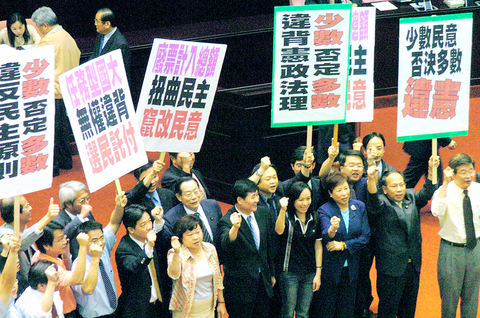The Democratic Progressive Party (DPP) legislative caucus yesterday said it would request a constitutional interpretation from the Council of Grand Justices, after the legislature struck down its proposition to reconsider part of the statute governing the operation of the National Assembly.
The move, however, is believed to have more political meaning than concrete significance, as a constitutional interpretation is time-consuming, and is unlikely to be resolved before the assembly meets at the beginning of next month.
The opposition-dominated legislature yesterday voted 124 to 87 against the DPP's motion to review two articles in the Law on the National Assembly's Exercise of Power (

PHOTO: SEAN CHAO, TAIPEI TIMES
A second vote also rejected the DPP's proposition, with 123 of the lawmakers voting against and 87 in favor. Holding placards reading "minority vetoing the majority, unconstitutional" and "oppose including invalid votes in the total number of votes," DPP lawmakers made a futile effort to call on opposition lawmakers to endorse their cause.
The legislature passed the law last Friday, which requires a three-quarters majority vote for the passage of constitutional amendments and stipulates that ballots cast by assembly members failing to toe their party's line should be dubbed "invalid," yet still be counted anyway.
The DPP caucus sought to overturn the article regarding the ratification threshold for constitutional amendments, hoping to lower the bar from 75 percent to a simple majority. It also wished to exclude invalid ballots from the total number of votes.
Following the DPP's failure, the law will proceed to the Presidential Office, where President Chen Shui-bian (陳水扁) is required to promulgate the law within 10 days after receiving notification from the legislature. In a bid to ensure the success of the constitutional amendments, DPP caucus whip Jao Yung-ching (趙永清) said that assembly members representing the DPP who fail to toe the party's line will be expelled and immediately replaced. His party will also request a second round of voting.
Jao also called on the Chinese Nationalist Party (KMT) to follow suit. In response, KMT caucus whip Chen Chieh (陳杰) said that his party was not a subordinate of the DPP and would not dance to its tune.
However, he pointed out that KMT Chairman Lien Chan (連戰) had made it clear that assembly members representing the party that defy it's stance on constitutional amendments would be ousted.
Chen also said that his caucus respects the DPP's will to request a constitutional interpretation because it is none of its business. People First Party (PFP) caucus whip Lee Yong-ping (
"I have no idea why it risks its credibility for such a short-lived piece of legislation," she said. "Besides, I'm wondering why it did not say anything about the law when it was passing the second and third readings, but then flip-flopped after it passed into law."
If any legislation can be amended simply because of the opposition voiced by one individual, Lee said, anybody can ask the lawmaking body to revamp any law if he threatens to recall the president. Lee was referring to former DPP chairman Lin I-hsiung (林義雄).
Also see story:

AIR SUPPORT: The Ministry of National Defense thanked the US for the delivery, adding that it was an indicator of the White House’s commitment to the Taiwan Relations Act Deputy Minister of National Defense Po Horng-huei (柏鴻輝) and Representative to the US Alexander Yui on Friday attended a delivery ceremony for the first of Taiwan’s long-awaited 66 F-16C/D Block 70 jets at a Lockheed Martin Corp factory in Greenville, South Carolina. “We are so proud to be the global home of the F-16 and to support Taiwan’s air defense capabilities,” US Representative William Timmons wrote on X, alongside a photograph of Taiwanese and US officials at the event. The F-16C/D Block 70 jets Taiwan ordered have the same capabilities as aircraft that had been upgraded to F-16Vs. The batch of Lockheed Martin

US President Donald Trump yesterday announced sweeping "reciprocal tariffs" on US trading partners, including a 32 percent tax on goods from Taiwan that is set to take effect on Wednesday. At a Rose Garden event, Trump declared a 10 percent baseline tax on imports from all countries, with the White House saying it would take effect on Saturday. Countries with larger trade surpluses with the US would face higher duties beginning on Wednesday, including Taiwan (32 percent), China (34 percent), Japan (24 percent), South Korea (25 percent), Vietnam (46 percent) and Thailand (36 percent). Canada and Mexico, the two largest US trading

GRIDLOCK: The National Fire Agency’s Special Search and Rescue team is on standby to travel to the countries to help out with the rescue effort A powerful earthquake rocked Myanmar and neighboring Thailand yesterday, killing at least three people in Bangkok and burying dozens when a high-rise building under construction collapsed. Footage shared on social media from Myanmar’s second-largest city showed widespread destruction, raising fears that many were trapped under the rubble or killed. The magnitude 7.7 earthquake, with an epicenter near Mandalay in Myanmar, struck at midday and was followed by a strong magnitude 6.4 aftershock. The extent of death, injury and destruction — especially in Myanmar, which is embroiled in a civil war and where information is tightly controlled at the best of times —

China's military today said it began joint army, navy and rocket force exercises around Taiwan to "serve as a stern warning and powerful deterrent against Taiwanese independence," calling President William Lai (賴清德) a "parasite." The exercises come after Lai called Beijing a "foreign hostile force" last month. More than 10 Chinese military ships approached close to Taiwan's 24 nautical mile (44.4km) contiguous zone this morning and Taiwan sent its own warships to respond, two senior Taiwanese officials said. Taiwan has not yet detected any live fire by the Chinese military so far, one of the officials said. The drills took place after US Secretary